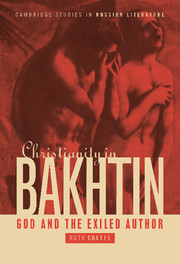Book contents
- Frontmatter
- Contents
- Acknowledgements
- List of abbreviations
- Note on translation and citation
- Chapter 1 Introduction
- Chapter 2 Fall and Incarnation in ‘Towards a Philosophy of the Act’
- Chapter 3 The aesthetic gospel of ‘Author and Hero in Aesthetic Activity’
- Chapter 4 Was Bakhtin a Marxist?: The work of the Bakhtin Circle, 1924–1929
- Chapter 5 Falling silent: the critical aesthetic of Problems of Dostoevsky's Creative Work
- Chapter 6 The exiled author: ‘Discourse in the Novel’ and beyond
- Chapter 7 Christian motifs in Bakhtin's carnival writings
- Chapter 8 The fate of Christian motifs in Bakhtin's work
- Notes
- Bibliography
- Index
- CAMBRIDGE STUDIES IN RUSSIAN LITERATURE
Chapter 4 - Was Bakhtin a Marxist?: The work of the Bakhtin Circle, 1924–1929
Published online by Cambridge University Press: 22 September 2009
- Frontmatter
- Contents
- Acknowledgements
- List of abbreviations
- Note on translation and citation
- Chapter 1 Introduction
- Chapter 2 Fall and Incarnation in ‘Towards a Philosophy of the Act’
- Chapter 3 The aesthetic gospel of ‘Author and Hero in Aesthetic Activity’
- Chapter 4 Was Bakhtin a Marxist?: The work of the Bakhtin Circle, 1924–1929
- Chapter 5 Falling silent: the critical aesthetic of Problems of Dostoevsky's Creative Work
- Chapter 6 The exiled author: ‘Discourse in the Novel’ and beyond
- Chapter 7 Christian motifs in Bakhtin's carnival writings
- Chapter 8 The fate of Christian motifs in Bakhtin's work
- Notes
- Bibliography
- Index
- CAMBRIDGE STUDIES IN RUSSIAN LITERATURE
Summary
Any assessment of Bakhtin's development from his position of the early 1920s in ‘Philosophy of the Act’ and ‘Author and Hero’ threatens to be tripped up at the very first hurdle, when approaching the work of the Bakhtin Circle from 1924, the date of Bakhtin's return to Leningrad, to 1929, the year of his arrest and sentence to exile. This is the period of the by now infamous texts of disputed authorship, around which debate has raged since the early 1970s, a debate whose details it has become tedious to rehearse.
THE NATURE OF THE CRITICAL DEBATE ON AUTHORSHIP
What is most striking about the numerous articles on this issue is the syncretistic approach adopted by all parties concerned. By this I mean that a given scholar's position is defended and that of his (or her) opponent attacked, using a variety of different strategies; quantity of proofs has been preferred to quality. Such an approach is understandable given the bewildering variety of angles from which one may address the question, but it does not make for either coherent arguments or satisfying conclusions. For this reason it is put to best use by those who, like Todorov (1984) or Perlina (1983), are not committed to one side or the other, or who, as in Wehrle's case (1978), derive post-structuralist satisfaction from the very ambiguity of the authorship question, or, again, whose main concern is to raise questions or cast doubts, as do Titunik (1984, 1986) and Morson and Emerson (1989, 1990).
- Type
- Chapter
- Information
- Christianity in BakhtinGod and the Exiled Author, pp. 57 - 83Publisher: Cambridge University PressPrint publication year: 1999



